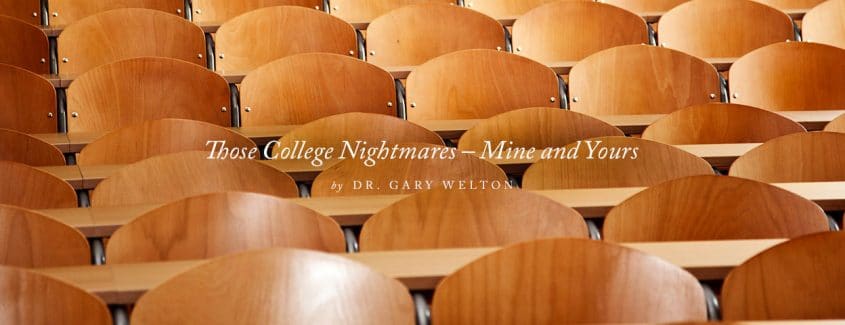
Dream surveys consistently show that dreaming about being back in school is among the top three content areas of our adult dreams. College is often described as being the best years of our lives (though I don’t care to repeat those years), yet our college dreams are more often nightmares than glowing memories.
Among my best college memories was the day I robbed a classmate of a three-run homer. My residence hall was one player short of a full softball team that afternoon and they recruited me as a last resort. Everyone thought of me as a total academic geek; they didn’t realize that I had several years of experience in the church softball league. On this college intramural team, however, I was clearly second string and was placed in right field, batting last. Late in the game a power hitter came to the plate with two runners on. I respected his strength and played him deep, but he powered the ball over my head. I knew that back peddling would never suffice. I turned and ran with one thought in mind—if I played this ball correctly, I could hold him to a triple. It would be a moral victory. Instead, when I turned back toward the plate to locate the ball, it landed in my glove. The nerd had robbed the clean-up hitter. But, alas, that event has never made it into my dreams.
Instead, I can’t find my locker, or, if I find it, I can’t remember the combination. I forget to study for a test; even worse, I forget to attend a class for the entire term. I forget to turn the test over to see the questions on the other side. Sometimes, I am one high school class short of finishing my Ph.D. Nobody said that college dreams had to make sense.
Psychologists still have divergent views on our dreams. Although there is the traditional Freudian notion that we are living out our unconscious sexual and aggressive instincts, more modern views suggest that our dreams reflect our unfinished cognitive processing from the moments before we fall asleep. From this view, our dreams help us to de-stress from the vivid emotions of our daily lives, as we reboot through the night.
Some suggest that college-based dreams are the result of adolescent and young adult maturation. Because of the adolescent’s new found independence, developing identity, and broadening horizons, memories from these years may be more strongly etched on our minds. The stakes are higher in college, as we are making our own decisions, at a college we chose to attend, studying a major that we selected, and investing serious money. Indeed, many suggest that there is a reminiscence bump, in which memories from late adolescence and early adulthood tend to be the strongest during our healthy adult years.
Yet my dreams are not memories, as they focus on events that never happened. I never forgot to attend a class; I never forgot to study for a test. One recent graduate reports dreaming that he was painting his classroom building floor in blue, eventually realizing he had no idea how to clean it up. That is not a memory that remotely resembles any actual event. Perhaps these college dreams do help us release pent up energy and frustrations from the academic pressure.
I suggest that you welcome and embrace your college dreams. Some college students struggle with the academic demands, but when there is a good fit between the student’s ability level and the college curriculum, the classroom creates a safe environment for learning, experimenting, and even failing. The stressors I have in my job today are exponentially more troubling than the stressors I had while in college, yet my dreams are not about work-related stress. They are about imagined college failures.
Embrace those imagined failures, for in these dreams you are safe from real danger. Reboot for another day of stress at work, put up your ball glove, and catch that ball. You’re the lead-off hitter in the top of the inning.

